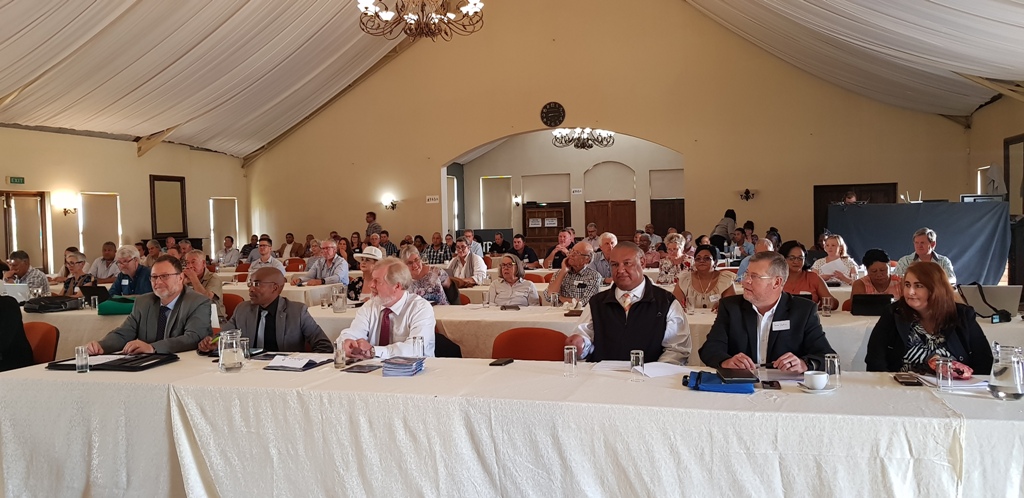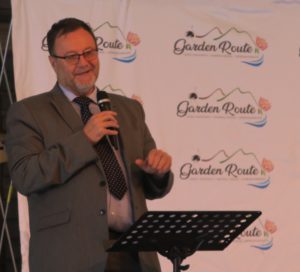Annual Garden Route Environmental Forum (GREF) hosted in George

The annual Garden Route Environmental Forum’s (GREF) key stakeholder event took place in George on 11 December 2019 under the theme: “Reflecting on regional environmental initiatives and planning ahead for 2020”. Mandated by the Garden Route District Municipality (GRDM), the GREF is the premier environmental platform in the Garden Route during which stakeholders collaborate about topics for conservation, environmental adaption and community interaction.

At the Forum, GRDM Executive Mayor, Cllr Memory Booysen officially welcomed stakeholders and guest from around the Western Cape and reminded them of the four major challenges the district faced, namely, “Invasive alien plants, water scarcity, electrical shortages, and unemployment’’. Cllr Booysen highlighted the importance to link ‘Invasive Alien Plants Eradication to Renewable Energy and Water Security, in an essence to address unemployment in the Garden Route District.
Western Cape Government (WCG) Provincial Minister of Local Government, Environmental Affairs and Development Planning, Mr Anton Bredell, presented the keynote address and stated that the Garden Route is the crown jewel of the Western Cape, and that stakeholders need to understand the science of planning for the future. Mr Bredell announced that the Western Cape faced 17 000 wildfires during 2017, including the devastating Knysna and Plettenberg Bay fires the same year. He continued by saying that the current drought situation causes havoc and a major concern for our future sustainability, as it is predicted that by the year 2030, the demand for fresh water will exceed 40% of supply.
Mr Bredell acknowledged and brought it to the attention of Councillors that the correct decisions may not always be the popular ones or the ones communities or councillors would prefer. In conclusion he emphasised that Government cannot address the environmental challenges on its own, “It is our responsibility to take action for our future generations – we have to take hands and be more proactive. As a collective we would have to work with landowners so that they can be held accountable for their legally mandated responsibilities.”

Speakers from various specialised fields of environmental management, for example, Department of Environment, Forestry and Fisheries (DEFF), Biodiversity and Coastal Management, SANParks and Agriculture, to name just a few, followed.
Delegates eagerly participated in discussions to find lasting solutions for prevailing regional problems, and a myriad of new challenges were identified and discussed. Discussions also took place on what the agricultural production scenario will reflect in two decades from now, what are the vulnerabilities of our coastline given the slight rise in ocean levels, stronger storm surges and floods, as well as to look at the fire risk to ever-expanding communities and the rural/urban interface.
For decades authorities and private landowners have dealt with the same problems, including non-sustainable land-use and land management best practice, increased fire risks and water security issues, a rapid decrease in natural habitat and biodiversity conservation, and compliance with environmental and agricultural legislation.

An all-out effort to ensure a climate-ready future, and a mind shift in the way we adapt and manage our environment, is urgent and should dominate the social and political narrative if the region aims to develop sustainably. An environment free of invasive alien plants and cleared waterways and catchments, will take the region a leap forward in risk reduction, and all authorities, landowners and land managers must heed the call.
With climate change, the spread of invasive alien plants and the intricate and long-term effects these environmental threats bring to the region, regional and local authorities, land managers and conservationists will have little choice but to plan around what nature will impose upon the region in years to come.
Editor’s Note:
GRDM and partners established the overarching Garden Route Environmental Forum, with the aim to coordinate regional conservation efforts, to serve as a catalyst to drive climate adaption practices in the Southern Cape, and to establish a better-coordinated approach to environmental management in the district. The Garden Route Environmental Forum aims to play a leading role in taking on environmental challenges, and to develop partnerships, in order to ensure and encourage a cohesive approach to find sustainable solutions.
